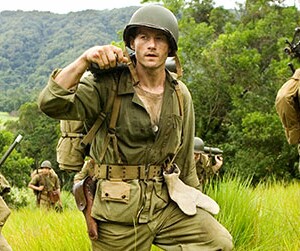HBO's "The Pacific" is a Masterpiece - Ed Martin - MediaBizBloggers

Where would we be without HBO?
That thought began running through my head about half way through the first chapter of the pay cable network's ten-hour masterpiece The Pacific, when I got the feeling that I was in for one of the most extraordinary viewing experiences of my life.
By hour ten I had upgraded my initial assessment. Simply put, The Pacific is one of the finest dramatic productions in the history of television. It may in fact be the best miniseries of all time, but I need to live with it a while and see if it sticks before making so definitive a declaration.
More to the point, it is astonishing that with all the growth in all media during the last twenty years, HBO is now virtually the only entity that can still execute a dramatic television production of this magnitude. As strong as so much dramatic television has been at the dawn of this new century, the sheer power of The Pacific is yet another reminder that there is only one HBO. Were it to somehow disappear, the loss would expand well beyond television or the entertainment industry into our culture itself.
Admittedly, that's the immediate impact of The Pacific talking. It is impossible to shake off, even a week after watching. Like HBO's previous miniseries milestone Band of Brothers before it, this epic drama of humbling triumph and staggering loss doesn't simply remind us of and educate us about the sacrifices and horrors endured by the men and women of this country and others during World War II. Rather, it honors them in a uniquely impressive fashion as only television can.
This seemingly insurmountable saga wisely focuses on the true stories of three real-life soldiers as it re-creates several devastating land battles across the Pacific Theater from 1941-45. Perhaps it is because we get to know these three men so completely that we are so convincingly plunged into hell right alongside them. As a result, as The Pacific progresses its emotional power strengthens to such a profound degree that we can feel the loss of each and every one of the Marines (and there are thousands) that are shown lying dead on the many beaches and jungle areas that became blood-soaked battlegrounds during those years.
If there was a problem with Band of Brothers it was its unrestrained ambition to tell as many stories about as many people as could be made to fit within its ten episodes. There were so many characters caught up in so much action that it was often difficult to understand exactly what was happening to whom, and certain emotional connections were compromised as a result. A second or third viewing clarified much of the story. By comparison, the equally ambitious but more restrained drama of The Pacific needs no such repeat viewing, though I suspect many viewers will want to watch it over again as soon as they reach its conclusion, because as painful and shattering as it is, this is one hell of an entertaining tale.
Thanks to its state of the art technology, the many battle sequences in The Pacific are every bit as unforgiving and intense as the opening half-hour of the modern World War II classic Saving Private Ryan. But there is outsize horror in its quiet, between-battle details, too: Marines carving valuable gold teeth out of the mouths of fallen Japanese soldiers (sometimes before they are dead), rats and crabs scurrying everywhere, all kinds of physical and mental illnesses, unrelenting rain and mud, and frequent mentions of the rancid stench that resulted from so much death in a hot, humid climate -- not to mention the ever-present threat of Japanese snipers. (The Japanese soldiers are largely depicted as lethal killing machines, though The Pacific is punctuated with profound moments in which some of the Marines catch fleeting glimpses of the men inside them.) The toll all of this takes on so many of the men in combat is devastating to see. (Watch for the telling scene in which one battle-hardened Marine tries to burn a crab with a cigarette but is stopped by a sensitive new recruit.)
The three real-life Marines around whom the story revolves – Robert Leckie (a budding journalist when he enlisted), Eugene Sledge (a young man who was almost kept from serving because of a medical condition) and John Basilone (a Medal of Honor recipient and national celebrity in wartime) – are played by James Badge Dale, Joe Mazzello and Jon Seda, respectively. These are heroic, heart-felt, multidimensional roles that most young actors only dream about, and these guys don't disappoint. The other standout is Rami Malek as Merriell "Snafu" Shelton, a smart-ass Marine in Sledge's company. Malek was an unknown actor until just a couple of weeks ago when he appeared on Fox's 24 (playing the terrorist who locked himself in a vault with the intention of blowing himself up). His work in The Pacific should make him a star.
Executive producers Tom Hanks, Steven Spielberg and Gary Goetzman, the team behind Band of Brothers, have with The Pacific once again delivered a landmark miniseries that will entertain and educate generations to come while ensuring that the heroism and sacrifices of generations past will never be forgotten. These three men (and the gifted producers, writers and directors with whom they collaborate) have performed an extraordinary service in honor of the men and women who served in World War II and the families and loved ones who supported them at home. Not to expect too much from them, but I wonder if they (in tandem with HBO) might consider a similar project about World War I before it completely recedes from memory. Someone ought to utilize today's technologies to tell those stories as well, in a way that they have never been (and could never be) told before.


